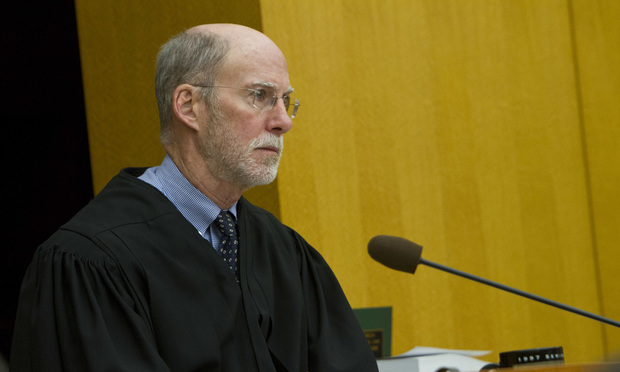Judge Corks College Park's Airport Booze Tax Suit Against Clayton County
Fulton County Superior Court Judge Henry Newkirk ruled that sovereign immunity protects Clayton County from claims that it improperly withholds tax collections from College Park.
June 18, 2018 at 01:38 PM
3 minute read
 A Fulton County judge on Wednesday threw out essentially all of a dispute between the city of College Park and Clayton County over the division of tax revenue from alcohol sales at Hartsfield-Jackson Atlanta International Airport, ruling the county is protected by sovereign immunity. The dispute has been brewing since 2015, when the city sued the county, saying it was improperly collecting and keeping taxes from wholesale and by-the-drink alcohol sales at the airport, where some areas of the concourse and terminals are in College Park and others in unincorporated Clayton. Clayton instructed vendors to split the taxes collected within the city limits but kept all of the taxes from unincorporated regions. College Park argued that it and the county should each collect taxes in their areas, then split the proceeds 50-50. Superior Court Judge Henry Newkirk agreed with College Park, ruling on summary judgment in 2015 that each party collect the taxes due in their jurisdiction and then divide the funds. He also ordered that the county to undergo an audit and hand over taxes it collected in years past, which at the time were estimated at about $2.5 million by the city's lawyer, Steven Fincher of Jonesboro's Fincher Denmark Minnifield. Fincher had said at the time that the city would realize about $80,000 to $100,00 a month from the tax split. Clayton County appealed, arguing among other thing, that the suit was barred by sovereign immunity. In 2017, the Georgia Supreme Court vacated and remanded the case, ruling the issue of whether sovereign immunity can be raised as a defense in disputes between political subdivisions was not settled law. In a unanimous opinion authored by Justice Michael Boggs, the high court said the issue “is a complex and important question, and one that we are reluctant to address in the first instance without affording the trial court an opportunity to consider the question and without complete briefing by the parties.” On June 12, Newkirk signed an order finding College Park's claims were “barred in their entirety by sovereign immunity,” with the exception of a takings claim the city included in its complaint. Prior Georgia Supreme Court rulings have stated that the state Constitution's takings clause, which provides for compensation as the remedy for an uncompensated taking, means such claims are not barred by sovereign immunity. The order said sovereign immunity also barred any claims against three county officials who were added to the complaint. The order was prepared by Clayton County's counsel, and notes that the issue of a county's immunity from a city lawsuit was decided in March by the Georgia justices in City of Union Point v. Greene County, S17A1878. That opinion, also authored by Boggs, found the county was immune to any of the city's claims for which a specific waiver of sovereign immunity had not been written into law. Clayton County's attorneys, Richard Carothers and Amy Cowan of Buford's Carothers & Mitchell, did not respond to requests for comment Friday, nor did Fincher.
A Fulton County judge on Wednesday threw out essentially all of a dispute between the city of College Park and Clayton County over the division of tax revenue from alcohol sales at Hartsfield-Jackson Atlanta International Airport, ruling the county is protected by sovereign immunity. The dispute has been brewing since 2015, when the city sued the county, saying it was improperly collecting and keeping taxes from wholesale and by-the-drink alcohol sales at the airport, where some areas of the concourse and terminals are in College Park and others in unincorporated Clayton. Clayton instructed vendors to split the taxes collected within the city limits but kept all of the taxes from unincorporated regions. College Park argued that it and the county should each collect taxes in their areas, then split the proceeds 50-50. Superior Court Judge Henry Newkirk agreed with College Park, ruling on summary judgment in 2015 that each party collect the taxes due in their jurisdiction and then divide the funds. He also ordered that the county to undergo an audit and hand over taxes it collected in years past, which at the time were estimated at about $2.5 million by the city's lawyer, Steven Fincher of Jonesboro's Fincher Denmark Minnifield. Fincher had said at the time that the city would realize about $80,000 to $100,00 a month from the tax split. Clayton County appealed, arguing among other thing, that the suit was barred by sovereign immunity. In 2017, the Georgia Supreme Court vacated and remanded the case, ruling the issue of whether sovereign immunity can be raised as a defense in disputes between political subdivisions was not settled law. In a unanimous opinion authored by Justice Michael Boggs, the high court said the issue “is a complex and important question, and one that we are reluctant to address in the first instance without affording the trial court an opportunity to consider the question and without complete briefing by the parties.” On June 12, Newkirk signed an order finding College Park's claims were “barred in their entirety by sovereign immunity,” with the exception of a takings claim the city included in its complaint. Prior Georgia Supreme Court rulings have stated that the state Constitution's takings clause, which provides for compensation as the remedy for an uncompensated taking, means such claims are not barred by sovereign immunity. The order said sovereign immunity also barred any claims against three county officials who were added to the complaint. The order was prepared by Clayton County's counsel, and notes that the issue of a county's immunity from a city lawsuit was decided in March by the Georgia justices in City of Union Point v. Greene County, S17A1878. That opinion, also authored by Boggs, found the county was immune to any of the city's claims for which a specific waiver of sovereign immunity had not been written into law. Clayton County's attorneys, Richard Carothers and Amy Cowan of Buford's Carothers & Mitchell, did not respond to requests for comment Friday, nor did Fincher.This content has been archived. It is available through our partners, LexisNexis® and Bloomberg Law.
To view this content, please continue to their sites.
Not a Lexis Subscriber?
Subscribe Now
Not a Bloomberg Law Subscriber?
Subscribe Now
NOT FOR REPRINT
© 2025 ALM Global, LLC, All Rights Reserved. Request academic re-use from www.copyright.com. All other uses, submit a request to [email protected]. For more information visit Asset & Logo Licensing.
You Might Like
View All
12-Partner Team 'Surprises' Atlanta Firm’s Leaders With Exit to Launch New Reed Smith Office
4 minute read
After Breakaway From FisherBroyles, Pierson Ferdinand Bills $75M in First Year
5 minute read
On the Move: Freeman Mathis & Gary Adds Florida Partners, Employment Pro Joins Jackson Lewis
6 minute readTrending Stories
- 1Paul Hastings, Recruiting From Davis Polk, Continues Finance Practice Build
- 2Chancery: Common Stock Worthless in 'Jacobson v. Akademos' and Transaction Was Entirely Fair
- 3'We Neither Like Nor Dislike the Fifth Circuit'
- 4Local Boutique Expands Significantly, Hiring Litigator Who Won $63M Verdict Against City of Miami Commissioner
- 5Senior Associates' Billing Rates See The Biggest Jump
Who Got The Work
J. Brugh Lower of Gibbons has entered an appearance for industrial equipment supplier Devco Corporation in a pending trademark infringement lawsuit. The suit, accusing the defendant of selling knock-off Graco products, was filed Dec. 18 in New Jersey District Court by Rivkin Radler on behalf of Graco Inc. and Graco Minnesota. The case, assigned to U.S. District Judge Zahid N. Quraishi, is 3:24-cv-11294, Graco Inc. et al v. Devco Corporation.
Who Got The Work
Rebecca Maller-Stein and Kent A. Yalowitz of Arnold & Porter Kaye Scholer have entered their appearances for Hanaco Venture Capital and its executives, Lior Prosor and David Frankel, in a pending securities lawsuit. The action, filed on Dec. 24 in New York Southern District Court by Zell, Aron & Co. on behalf of Goldeneye Advisors, accuses the defendants of negligently and fraudulently managing the plaintiff's $1 million investment. The case, assigned to U.S. District Judge Vernon S. Broderick, is 1:24-cv-09918, Goldeneye Advisors, LLC v. Hanaco Venture Capital, Ltd. et al.
Who Got The Work
Attorneys from A&O Shearman has stepped in as defense counsel for Toronto-Dominion Bank and other defendants in a pending securities class action. The suit, filed Dec. 11 in New York Southern District Court by Bleichmar Fonti & Auld, accuses the defendants of concealing the bank's 'pervasive' deficiencies in regards to its compliance with the Bank Secrecy Act and the quality of its anti-money laundering controls. The case, assigned to U.S. District Judge Arun Subramanian, is 1:24-cv-09445, Gonzalez v. The Toronto-Dominion Bank et al.
Who Got The Work
Crown Castle International, a Pennsylvania company providing shared communications infrastructure, has turned to Luke D. Wolf of Gordon Rees Scully Mansukhani to fend off a pending breach-of-contract lawsuit. The court action, filed Nov. 25 in Michigan Eastern District Court by Hooper Hathaway PC on behalf of The Town Residences LLC, accuses Crown Castle of failing to transfer approximately $30,000 in utility payments from T-Mobile in breach of a roof-top lease and assignment agreement. The case, assigned to U.S. District Judge Susan K. Declercq, is 2:24-cv-13131, The Town Residences LLC v. T-Mobile US, Inc. et al.
Who Got The Work
Wilfred P. Coronato and Daniel M. Schwartz of McCarter & English have stepped in as defense counsel to Electrolux Home Products Inc. in a pending product liability lawsuit. The court action, filed Nov. 26 in New York Eastern District Court by Poulos Lopiccolo PC and Nagel Rice LLP on behalf of David Stern, alleges that the defendant's refrigerators’ drawers and shelving repeatedly break and fall apart within months after purchase. The case, assigned to U.S. District Judge Joan M. Azrack, is 2:24-cv-08204, Stern v. Electrolux Home Products, Inc.
Featured Firms
Law Offices of Gary Martin Hays & Associates, P.C.
(470) 294-1674
Law Offices of Mark E. Salomone
(857) 444-6468
Smith & Hassler
(713) 739-1250







